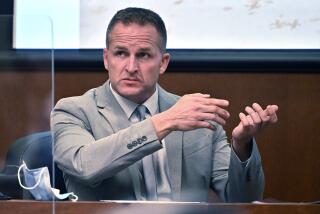Court-martial decision postponed for soldier in Afghan shooting
After a hearing in which military lawyers debated to what extent soldiers can be held accountable for split-second decisions in the heat of combat, a ruling on whether to court-martial a soldier who killed an unarmed physician in southern Afghanistan has been postponed until July 31.
The case of Army Sgt. 1st Class Walter Taylor, heard before a military court in Germany last month, now rests with Lt. Col. Alva Hart, investigating officer with the 16th Sustainment Brigade.
Hart will determine whether there are reasonable grounds to hold the 31-year-old veteran of four combat deployments for trial on charges of negligent homicide in the shooting of the civilian doctor. The shooting occurred at the end of a tense gunfight; the doctor’s car had raced into the middle of the battle, adding to the confusion.
Hart on Tuesday signaled his intention to delay his recommendation until the end of the month, allowing time to prepare detailed transcripts of testimony from some of the 26 witnesses who appeared during the three-day hearing in Germany.
Aqilah Hikmat, 49, head of obstetrics at Afghanistan’s Ghazni provincial hospital, was driving toward the capital, Kabul, with her family in July 2011 when their car sped up and passed one of two cars full of insurgents. The gunmen were firing at Taylor and his soldiers from the 38th Route Clearance Platoon, 541st Sapper Company, in the wake of a roadside bomb explosion that had seriously injured five U.S. soldiers and killed an Afghan civilian.
Taylor fired on Hikmat as she exited the vehicle and made her way toward the back of the car.
Military prosecutors, who have charged Taylor with dereliction of duty and negligent homicide, said he failed to comply with the Army’s rigorous rules of engagement. Those rules require soldiers to positively identify targets as noncivilians and to ascertain that they are demonstrating hostile intent toward U.S. forces before engaging them.
Taylor, who was gravely injured in a grenade attack 10 days after the shooting, told the hearing officer that he had only seconds to make a decision and that he fired because he believed the figure exiting the car was an insurgent preparing to detonate a second bomb.
“Nothing about the car, nothing about the person who exited the car, led me to believe that he or she was a noncombatant.... I never had before witnessed a civilian vehicle drive into a gunfight,” Taylor said at the hearing, according to a package of recorded testimony made available to the Los Angeles Times.
“I deeply regret the death of Dr. Hikmat, and I regret that the members of her family were killed and wounded… [But] I continue to believe I made the best decision that I could have under the circumstances,” he said.
In the heat of battle
Taylor’s civilian lawyer, James Culp, said the Army is crossing into uncharted territory if it attempts to hold soldiers criminally responsible for acts of mere negligence committed during intense combat, when clarity and certainty are often elusive.
“If we are going to court-martial our soldiers over decisions made in the heat of battle on a negligence standard, then we need to be prepared to rewrite the operational handbook. Because this is new,” Culp told the court. “In addition to bodily harm or death, people are [now] starting to fear that they will be court-martialed for the best decisions they can come up with under the worst of circumstances.”
A parade of soldiers from Taylor’s unit testified to the high standards of professionalism the 13-year Army veteran normally demanded of himself and his soldiers. They, too, thought the car in which Hikmat was riding had appeared to be part of the attack, they testified.
But the Army prosecutor who presented the case, Capt. Courtney M. Cohen, argued that Taylor fired the fatal shot at least 10 minutes after a cease-fire had been called, during which Hikmat’s vehicle had stood stationary with no signs of a threat.
Inside the car, Hikmat’s son and niece were dead, and her husband was wounded.
“This event unfolded over the course of 20 to 30 minutes, and according to the rules of engagement … one of the requirements is to continually reassess the threat, respond accordingly, and use only the minimum and appropriate level of [force],” Cohen said.
“Taylor admits to shooting at least 10 rounds at Dr. Hikmat. Sir, Sgt. 1st Class Taylor did not even give Dr. Hikmat a chance,” she said. “That day, Sgt. 1st Class Taylor was willing to compromise the rules of engagement in order to bring his ‘babies’ home.”
Testimony raises questions
A key piece of the prosecution’s evidence is an October 2011 report from the Army’s Criminal Investigative Division, or CID. In that report, Taylor is said to have told the investigating agent that although he “wanted to believe” the people in Hikmat’s car were involved in the gunfight, it turned out they were not. Yet, he said, “someone had to pay for what my platoon had gone through.”
The prosecution also presented testimony from Sgt. Richard McKelvey, who said he was with Taylor as they approached the vehicle after Hikmat was dead, and her husband was seen still moving inside the car. “That’s what you get,” he said Taylor declared as they approached the car.
McKelvey said he “didn’t think much of it at the time, because everybody says a lot of things when you’re under high stress.”
On cross-examination, McKelvey admitted that Taylor earlier had blocked his promotion and, he believed at the time, spread a false rumor that McKelvey had revealed the deaths of two popular members of the platoon to their families before Army officers had had a chance to officially notify them.
This suggested McKelvey might have been trying to get Taylor in trouble, argued Culp, who vehemently rejected the idea that Taylor ever told Army investigators that someone “had to pay” for what had happened to his men.
Under cross-examination, the investigator, Special Agent Perry Doegah, admitted that he had not recorded the interview with Taylor, as recommended by CID regulations. Taylor’s potentially damaging statement was written in by Doegah at the tail end of an exhausting, five-hour interrogation, Culp argued, in order to create useful evidence for a case prosecutors were initially investigating as a murder.
He said Taylor signed the statement without carefully reading it because of the injuries to his eyesight sustained in the grenade attack and because he trusted the CID agent to write down his statements truthfully. “He thought this special agent, because he wears a uniform, was a man of honor, and that he would do the right thing,” Culp said. “He trusted him, and he shouldn’t have.”
The postponement of the court-martial decision makes Taylor’s injuries a crucial issue. Army doctors have said Taylor needs immediate follow-up treatment in the U.S., including half a dozen additional surgeries, in order to reconstruct his nose before it heals in its current disfigured state.
So far, however, he has been ordered to remain in Bamberg, Germany, where his unit is stationed, pending the outcome of the legal proceedings.
“From a medical standpoint, the reconstructions needed are multiple and will last anywhere from six months to a year by the time they are done, his eyesight had been so badly damaged,” one of Taylor’s doctors, Maj. Jared Theler, said in an email to the defense team.
“It seems unfair that an individual like SFC Taylor should serve his country and get injured in such a dramatic manner and not receive the prompt reconstruction he requires.”
ALSO:Florida teen loses arm -- but not his wit -- to alligator
Man’s 7th DUI involved collision, teen passengers -- and a judge
Former Penn State president says he was unaware of Sandusky abuse
Follow Kim on Twitter @kimmurphy. Email: [email protected]
More to Read
Sign up for Essential California
The most important California stories and recommendations in your inbox every morning.
You may occasionally receive promotional content from the Los Angeles Times.










